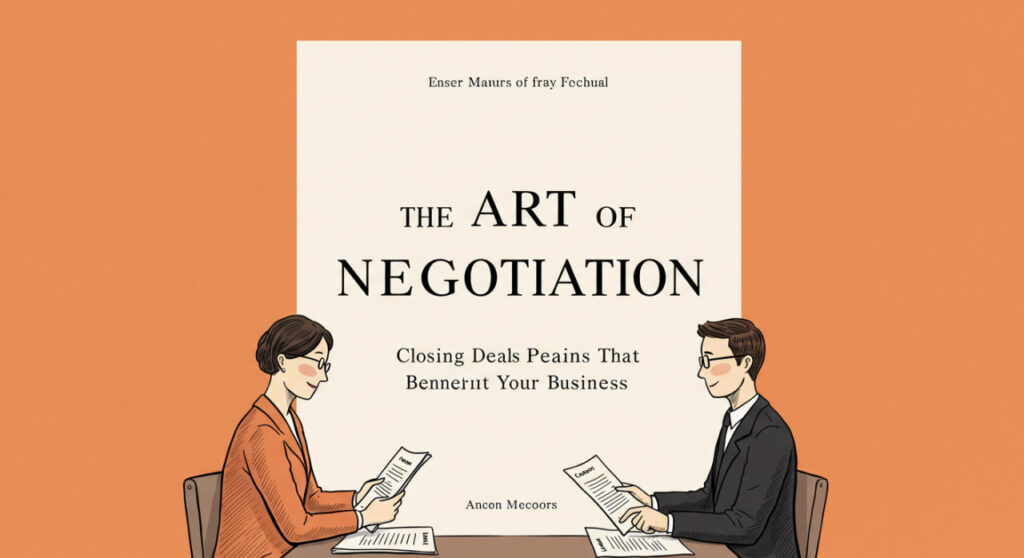Negotiation is a cornerstone of business success, a skill that can transform opportunities into tangible wins. Whether you’re securing a partnership, finalizing a contract, or navigating a high-stakes deal, mastering the art of negotiation ensures your business thrives in competitive environments. This article dives into the strategies, techniques, and mindset needed to close deals that not only meet your goals but also foster long-term relationships. From preparation to execution, we’ll explore how to negotiate with confidence, clarity, and mutual benefit in mind.
Why Negotiation Matters in Business
Negotiation isn’t just about getting what you want—it’s about creating value for all parties involved. A well-negotiated deal can lead to stronger partnerships, better financial outcomes, and a reputation for fairness and professionalism. In today’s fast-paced business world, where competition is fierce and trust is paramount, effective negotiation sets you apart. It’s a skill that blends emotional intelligence, strategic thinking, and adaptability to achieve outcomes that drive growth. Whether you’re a startup founder or a seasoned executive, understanding the nuances of negotiation can mean the difference between a missed opportunity and a game-changing agreement.
The Psychology Behind Successful Negotiation
At its core, negotiation is about understanding people. The best negotiators are those who can read emotions, anticipate needs, and build rapport. By empathizing with the other party, you can uncover their priorities and tailor your approach accordingly. For example, active listening—nodding, paraphrasing, and asking clarifying questions—signals respect and fosters trust. Meanwhile, maintaining confidence without arrogance projects authority, encouraging the other side to take you seriously. Understanding these psychological dynamics allows you to navigate tense moments and steer discussions toward mutually beneficial outcomes.
Preparing for a Negotiation: The Foundation of Success
Preparation is the bedrock of any successful negotiation. Before you sit at the table, you need a clear understanding of your goals, your limits, and the other party’s perspective. Start by defining your objectives: What’s your ideal outcome? What are your non-negotiables? Next, research the other party’s needs, challenges, and motivations. Are they prioritizing cost, speed, or quality? Armed with this knowledge, you can craft a proposal that aligns with their interests while safeguarding your own. Preparation also means anticipating objections and having responses ready, ensuring you’re never caught off guard.
Setting Clear Objectives
Your objectives should be specific, measurable, and realistic. For instance, if you’re negotiating a vendor contract, determine your target price, delivery timeline, and quality standards. Equally important is identifying your BATNA—Best Alternative to a Negotiated Agreement. Knowing your fallback plan gives you leverage and confidence to walk away if the deal doesn’t meet your minimum requirements. By setting clear objectives, you create a roadmap that keeps you focused during the negotiation process.
Researching the Other Party
Knowledge is power in negotiation. Dive into the other party’s business model, market position, and recent developments. Are they under pressure to cut costs? Are they expanding into new markets? Tools like LinkedIn, company websites, and industry reports can provide valuable insights. Understanding their pain points allows you to position your offer as a solution, making it harder for them to say no. For example, if a client values sustainability, highlight how your product or service aligns with eco-friendly practices.
Key Negotiation Strategies for Closing Deals
Once you’re at the table, the real work begins. Effective negotiation requires a blend of assertiveness, flexibility, and creativity. Here are some proven strategies to help you close deals that benefit your business.

Build Rapport and Trust
People do business with those they like and trust. Start the negotiation with genuine small talk to break the ice—perhaps a shared interest or a compliment on their recent achievements. This sets a collaborative tone. Throughout the discussion, maintain transparency about your goals while showing genuine interest in their needs. A simple gesture, like acknowledging their perspective with a phrase like, “I see where you’re coming from,” can diffuse tension and pave the way for compromise.
Use the Power of Silence
Silence is a powerful tool in negotiation. After making an offer or responding to a counteroffer, resist the urge to fill the quiet. Let the other party process your words and respond first. This not only gives them space to reveal their thoughts but also prevents you from over-explaining or weakening your position. A well-timed pause can shift the dynamic, encouraging the other side to make concessions or clarify their stance.
Focus on Win-Win Outcomes
The best deals leave both parties feeling satisfied. Instead of approaching negotiation as a zero-sum game, look for ways to create value. For instance, if a client balks at your price, offer flexible payment terms or additional services that don’t significantly increase your costs. This approach, often called “expanding the pie,” ensures that both sides walk away with something valuable. It also builds goodwill, increasing the likelihood of future collaborations.
Common Negotiation Mistakes to Avoid
Even seasoned negotiators can fall into traps that undermine their efforts. Recognizing and avoiding these pitfalls can make the difference between a good deal and a great one.
Failing to Listen Actively
One of the biggest mistakes is talking more than listening. If you’re too focused on pushing your agenda, you might miss critical cues about the other party’s needs or concerns. Practice active listening by summarizing their points and asking open-ended questions like, “Can you tell me more about what’s driving that decision?” This not only clarifies their position but also shows respect, making them more open to compromise.
Being Overly Rigid
While it’s important to know your limits, being inflexible can derail a negotiation. If you refuse to budge on price, for example, you might lose a deal that could have been salvaged with creative concessions, like extended warranties or faster delivery. Stay firm on your core priorities but be willing to explore alternative solutions that meet both parties’ needs.
Neglecting Emotional Control
Negotiations can get heated, especially when stakes are high. Letting emotions take over—whether frustration, impatience, or excitement—can cloud your judgment and weaken your position. Practice emotional discipline by taking deep breaths, pausing before responding, and keeping your tone calm and professional. This not only keeps the conversation productive but also positions you as a confident and composed negotiator.
Closing the Deal: Sealing the Agreement
The final stage of negotiation is where deals are won or lost. As you approach the close, summarize the agreed-upon terms to ensure clarity and alignment. For example, say, “So, we’re agreeing on amental health, or business strategies, the ability to negotiate effectively is a game-changer. By preparing thoroughly, employing smart strategies, and avoiding common pitfalls, you can close deals that drive your business forward while building lasting relationships. With practice and persistence, negotiation becomes not just a skill but an art form that empowers you to shape your business’s future.
FAQ
What is the most important skill in negotiation?
The most important skill in negotiation is active listening. By truly understanding the other party’s needs and concerns, you can tailor your approach to create mutually beneficial outcomes, fostering trust and collaboration.
How can I prepare effectively for a negotiation?
Effective preparation involves defining clear objectives, researching the other party’s needs and motivations, and identifying your BATNA (Best Alternative to a Negotiated Agreement). This groundwork ensures you’re confident and strategic during the discussion.
What should I do if the other party is uncooperative?
If the other party is uncooperative, focus on building rapport, asking open-ended questions to uncover their concerns, and proposing creative solutions that address their needs while protecting your interests. Patience and empathy can often turn the conversation around.
How do I know when to walk away from a negotiation?
You should walk away when the proposed terms fall below your BATNA or compromise your core objectives. Knowing your limits and having a strong alternative plan gives you the confidence to exit gracefully if needed.
Can negotiation skills be learned?
Absolutely. Negotiation is a skill that improves with practice, study, and self-reflection. By studying techniques, role-playing scenarios, and analyzing past negotiations, anyone can become a more effective negotiator over time.



